Work, Freedom, Rights, and Ethical Boundaries Are Essential Elements of a Fair and Just Free Market
The Bible contains many endorsements of free enterprise, including verses in the Gospels and Proverbs.
— “Free enterprise and the Bible,” a short but insightful article at conservapedia.com —
Capitalism is not economic anarchy. It recognizes several necessary conditions for the kinds of voluntary relationships it recommends. One of these presuppositions is the existence of inherent human rights, such as the right to make decisions, the right to be free, the right to hold property, and the right to exchange what one owns for something else. Capitalism also presupposes a system of morality. Capitalism should be thought of as a system of voluntary relationships within a framework of laws which protect peoples’ rights against force, fraud, theft, and violations of contracts.
— Ronald Nash —
Key point: Not only was Jesus not a socialist, He actually assumed and affirmed the principles of capitalism and free enterprise — not always overtly, but nevertheless unmistakably.1 King Solomon, the apostles Paul and Peter, and the early church did as well — and modern-day Christians and the church in the 21st century need desperately to understand this. The free market is a biblical approach to economic policy, and socialism is unbiblical — even blatantly so.
All of the articles in this series are accessible from this page.
In parts 1, 2, and 3 we examined eight passages of Scripture that are supportive of the free market economic model and that push back against socialism. As we come now to consider the remaining four of the twelve verses or sets of verses we’re highlighting in this series, I encourage you to keep in mind the principle we emphasized in part 1:
The core difference between socialism and free enterprise is found in the former’s denial versus the latter’s affirmation of private property rights. Socialism cannot exist in a society that recognizes and affirms private property rights — the rights to own and control finances and other tangible assets. Conversely, a free market economy cannot exist among a people who reject and deny property rights.

You show me a person who thinks supporters of private property right are selfish, and I’ll show you a socialist, an enemy of freedom, and a tyrant or a friend of tyranny (even if he or she doesn’t realize it).
You show me a person who thinks supporters of private property right are selfish, and I’ll show you a socialist, an enemy of freedom, and a tyrant or a friend of tyranny.
Our ninth Bible passage, Proverbs 10:4-5, affirms that just as there is a direct correlation between laziness and poverty, so, too, there is a direct correlation between hard work and wealth. Were property rights not a reality, this principle wouldn’t be true. In the New International Version (NIV) these verses state, “Lazy hands make for poverty, but diligent hands bring wealth. He who gathers crops in summer is a prudent son, but he who sleeps during harvest is a disgraceful son.” Many other passages in Proverbs (including what Proverbs 31 says about the virtuous wife) echo this principle. This one from Ecclesiastes echoes it too!
Tenth, Ephesians 4:28 by itself deals a death blow to socialism. Paul wrote to the Ephesian Christians, “Let him who stole steal no longer, but rather let him labor, working with his hands what is good, that he may have something to give him who has need.”
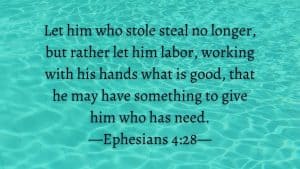
Here we see the importance of each of these elements:
-
-
- repenting of disobedience to God’s commands (in this case, stealing),
- changing one’s habits to conform to His commands (laboring with one’s hands, and, by implication, with one’s mind, ingenuity, and imagination),
- engaging in constructive, productive work to produce something beneficial and helpful,
- accumulating wealth legitimately (including following God’s guidelines for economic transactions),
- using resources wisely, and
- voluntarily helping those in need.
-
All of these elements are consistent with a free market economic system, and none of them is fostered or encouraged by socialism. This is why socialism is not compassionate, and it’s why socialism doesn’t work!
Eleventh, in Matthew 20:1-16 we find Jesus’ parable of the workers in the vineyard. A landowner needed laborers in his vineyard, and throughout the day, he hired numerous workers at various times. Those he hired early in the morning agreed to a day’s wage, and they went to work. Later in the day he took on others, promising to pay them a “whatever is right.”
The owner of the vineyard even hired people to work for him very late in the day, making that same commitment to them. When the workday was over, he arranged for the workers he’d hired last to be paid first. Each one received a day’s wage — the same amount the landowner had agreed to pay those he’d hired early and who’d worked the entire day. When the people who had worked the full day saw this, they began to expect they would be paid more. They were disappointed when they received a day’s wage, even though this was the amount the landowner had promised them at the beginning of the day when he hired them.
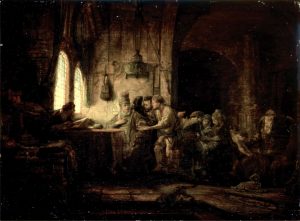
When they complained, the landowner responded to “one of them,” saying, “Friend, I am doing you no wrong. Did you not agree with me for a denarius [a day’s wage]? Take what is yours and go your way. I wish to give to this last man the same as to you.” Then, significantly, the landowner added, “Is it not lawful for me to do what I wish with my own things?”
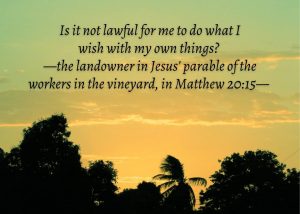
Even though private property ownership and control over one’s assets are not among the primary themes of this parable, we are wise to note that these themes are an inherent in it. Verse 15 is a clear and unmistakable affirmation of private property rights; Jesus assumed private property rights and other free marked principles, not only in this parable, but in many of His other parables as well.
Twelfth, in Acts 5:1-11 we read the horrific account of Ananias and his wife Sapphira. This couple were members of the early church and gave the church a portion of the money they’d received from selling a piece of property they had owned. Ananias and Sapphira lied about the amount they gave; they claimed they’d contributed the full amount they received from the sale, but instead they held a portion of the money back for themselves. The apostle Peter knew and confronted Ananias, saying,
“Ananias, why has Satan filled your heart to lie to the Holy Spirit and keep back part of the price of the land for yourself? While it remained, was it not your own? And after it was sold, was it not in your own control? Why have you conceived this thing in your heart? You have not lied to men but to God.”
Ananias dropped dead on the spot! His wife wasn’t present at the time, but Peter confronted her as well when she appeared a few hours later — and she, too, “fell down…and breathed her last.” Verse 11 tells us, “So great fear came upon all the church and upon all who heard these things.”
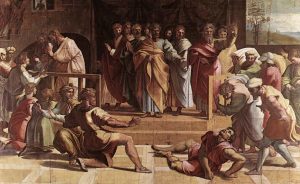
Reread Peter’s words to Ananias carefully. Peter affirmed that the two were free to do as they wished regarding the sale of the property and to decide how much, if any, of the proceeds from the sale they would donate to the church. Ananias and Sapphira would not have sinned if they had kept the property for themselves; nor would they have sinned if they had sold the property and kept the full amount for themselves. Their sin was in their lying about the amount they gave! Again, they claimed they had given the full amount of the sale when they had not.
All of this is important because Peter’s words to Ananias affirm and uphold private property rights among the members of the early church. Sometimes leftist evangelicals contend that the members of the early church practiced socialism. They point to Acts 2:44-45 and 4:34-35 — passages that describe voluntary giving and the church’s meeting the needs of its members, not the forced reapportioning of resources by the government that socialism demands.
The government was not involved. All were free to give, or not give, as they wished. Moreover, the gifts that were given were “laid…at the apostles’ feet.” Hear Dr. D. James Kennedy explain the significance of this phrase. This audio clip comes from this video of Dr. Kennedy’s sermon “The Bankruptcy of Socialism.”

Everything Peter said to Ananias about the rights of ownership and control he and Sapphira had over their assets applied to all the other members of the church as well. Keep in mind that the events of Acts 5:1-11 take place on the heels of the events occurring in Acts 2:44-45 and 4:34-35. Again, in the early church we see absolutely no evidence of socialism; in fact, we see private property rights clearly upheld.
Conclusion: Collectivism Eliminates Rights — and Freedom
Here are all twelve of the passages we’ve highlighted in this series of posts. Our list is far from exhaustive. Throughout Scripture, free market economic principles are both assumed and inherently affirmed. We conclude with three insightful quotations.
First, in a speech he delivered at William and Mary College in 1926, President Calvin Coolidge declared,
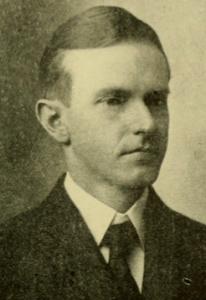
No method of procedure has ever been devised by which liberty could be divorced from local self-government. No plan of centralization has ever been adopted which did not result in bureaucracy, tyranny, inflexibility, reaction, and decline. Of all forms of government, those administered by bureaus are about the least satisfactory to an enlightened and progressive people. Being irresponsible they become autocratic, and being autocratic they resist all development. Unless bureaucracy is constantly resisted it breaks down representative government and overwhelms democracy. It is the one element in our institutions that sets up the pretense of having authority over everybody and being responsible to nobody.
In other words, plans of centralization and tyrannies are found in the same places. Tyrannies become laws unto themselves because they refuse to recognize God’s law — and it is no coincidence that they also curtail and even totally squash personal freedom. People — human beings who are made in God’s image — reflect His image when they can act freely within the boundaries of God’s laws.
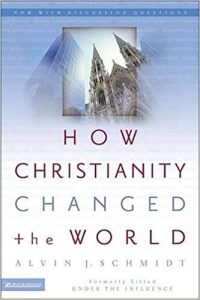 Our second quote comes from sociologist and historian Alvin J. Schmidt. In his landmark work How Christianity Changed the World, Dr. Schmidt observes (emphasis added),
Our second quote comes from sociologist and historian Alvin J. Schmidt. In his landmark work How Christianity Changed the World, Dr. Schmidt observes (emphasis added),
Just as God does not want people to be coerced in spiritual matters, so too he does not want them to be coerced in earthly matters, for instance, in their economic activities. There is not a single reference in either the Old or New Testament in which God denies economic freedom to people, as in fascism, socialism, and communism.2
In our third quote, we see that historian William J. Federer would agree. He observed,
There is no biblical command for government to help the poor, or take care of the sick, or operate schools, or provide jobs, healthcare, education, or other entitlements.
Biblically, these tasks are to be addressed in the private sector, through individual charity and organizational charity, as well as ministry performed by the church that includes benevolence.
Although it isn’t perfect, the free market simultaneously encourages all people (rich and poor alike) to take advantage of opportunities to improve their situations and to carve out additional opportunities to do the same. Recall what happened in Jamestown and Plymouth in North America. in the early 1600s. Socialism fails every time, but free enterprise paves the way for prosperity and freedom.
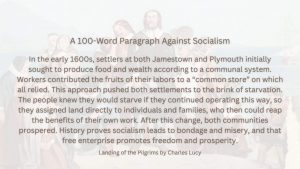
You see, free markets encourage people of all talents and backgrounds to use their gifts creatively to find their particular niche. Opportunities involve imagination, ingenuity, innovation, productivity, and service to others. In a free market, people can actively work to fulfill the cultural commission and to follow the principles and commands in other biblical passages on work, stewardship, productivity, and charity. They benefit from the rewards that the market affords them by serving others efficiently and well.
Don’t be misled. Socialism and Scripture are incompatible — completely.
Copyright © 2023 by B. Nathaniel Sullivan. All rights reserved.
top image credit: Photo by Nathan Cima on Unsplash
This article is available for publication and distribution by Exposing enemies within the church, LLC.
-
-
- Part 1 of this series is available here.
Having ownership and control over tangible assets Is an expression of what it means to be human. Moreover, property rights also are essential to economic and personal freedom — types of freedom that also are at the heart of what it means to be human.
June 29, 2023 - Part 2 of this series is available here.
Who Has the Responsibility of Meeting the People’s Needs?
July 3, 2023 - Part 3 of this series is available here.
God’s Design Fosters Responsibility, Freedom, and Fulfillment
July 6, 2023 - Part 4 of this series — this page:
Work, Freedom, Rights, and Ethical Boundaries: Essential Elements of a Fair and Just Free Market
July 11, 2023
- Part 1 of this series is available here.
-
Unless otherwise indicated, Scripture has been taken from the New King James Version®. Copyright © 1982 by Thomas Nelson, Inc. Used by permission. All rights reserved.
The Scripture quotation designated NIV is from The Holy Bible, New International Version®, NIV® Copyright © 1973, 1978, 1984, 2011 by Biblica, Inc.® Used by permission. All rights reserved worldwide.
Note:
2You can explore Jesus’ perspective on economic ideas here.
2Alvin J. Schmidt, How Christianity Changed the World, (Grand Rapids: Zondervan, 2004), 205.
